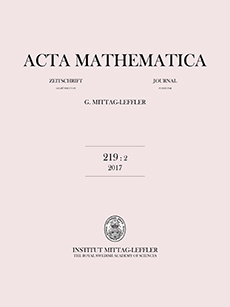Abstract
We introduce and analyze lower (Ricci) curvature bounds $ \underline{{Curv}} {\left( {M,d,m} \right)} $ ⩾ K for metric measure spaces $ {\left( {M,d,m} \right)} $. Our definition is based on convexity properties of the relative entropy $ Ent{\left( { \cdot \left| m \right.} \right)} $ regarded as a function on the L2-Wasserstein space of probability measures on the metric space $ {\left( {M,d} \right)} $. Among others, we show that $ \underline{{Curv}} {\left( {M,d,m} \right)} $ ⩾ K implies estimates for the volume growth of concentric balls. For Riemannian manifolds, $ \underline{{Curv}} {\left( {M,d,m} \right)} $ ⩾ K if and only if $ Ric_{M} {\left( {\xi ,\xi } \right)} $ ⩾ K$ {\left| \xi \right|}^{2} $ for all $ \xi \in TM $.
The crucial point is that our lower curvature bounds are stable under an appropriate notion of D-convergence of metric measure spaces. We define a complete and separable length metric D on the family of all isomorphism classes of normalized metric measure spaces. The metric D has a natural interpretation, based on the concept of optimal mass transportation.
We also prove that the family of normalized metric measure spaces with doubling constant ⩽ C is closed under D-convergence. Moreover, the family of normalized metric measure spaces with doubling constant ⩽ C and diameter ⩽ L is compact under D-convergence.
Citation
Karl-Theodor Sturm. "On the geometry of metric measure spaces." Acta Math. 196 (1) 65 - 131, 2006. https://doi.org/10.1007/s11511-006-0002-8
Information





